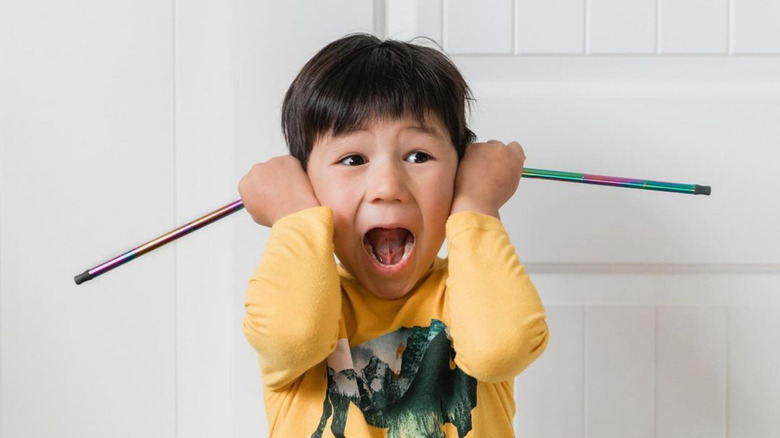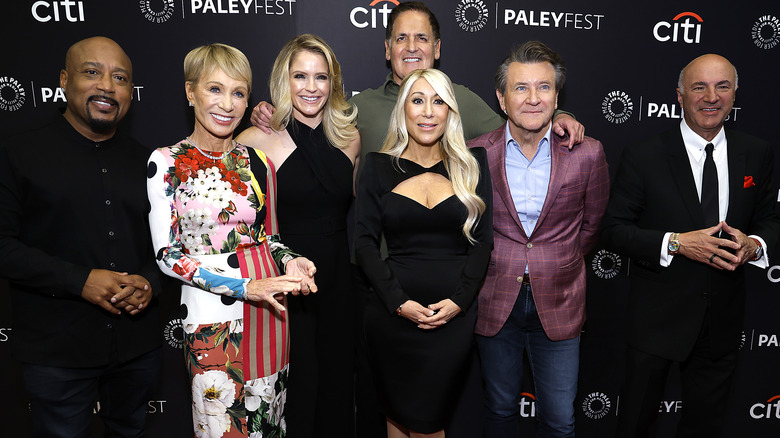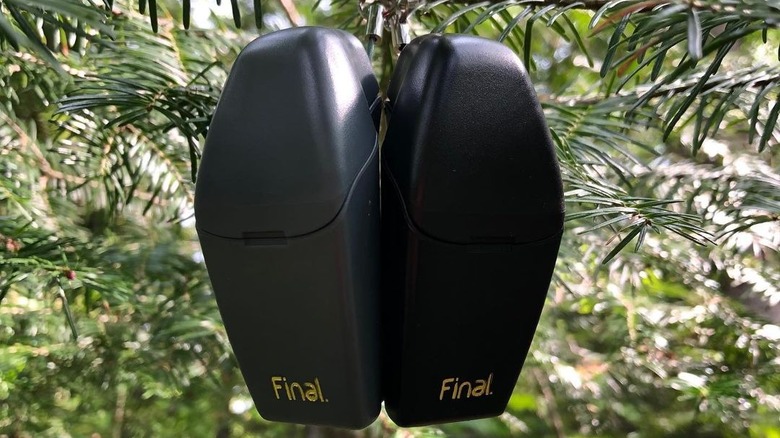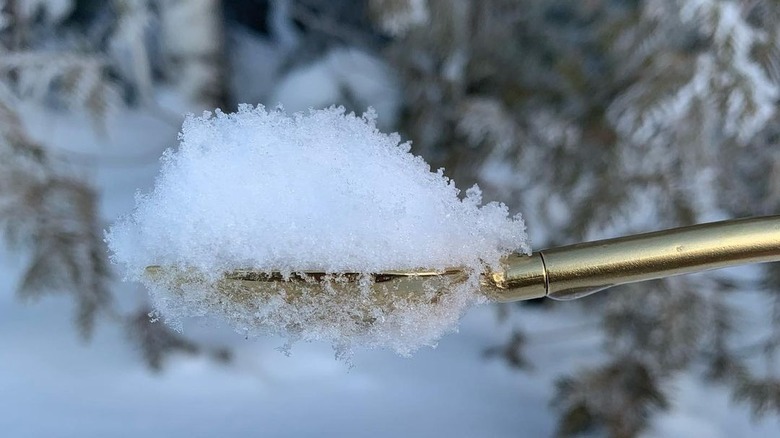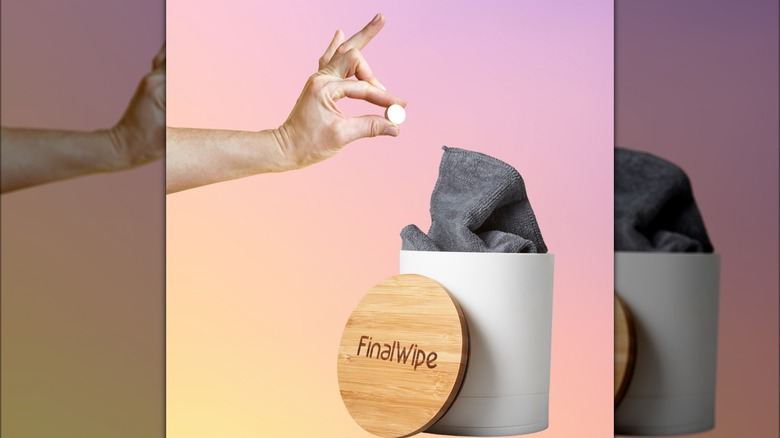FinalStraw: Here's What Happened After Shark Tank
We may receive a commission on purchases made from links.
FinalStraw appeared on the "Shark Tank" season 10 premiere in 2018 at a time when plastic straws were undergoing a global revolution. The video about a plastic straw painfully wedged inside a sea turtle's nose had gone viral a few years before; America alone was speculated to be using 500 million of these straws each day, and Seattle had become the first major city in the U.S. to ban their use in food service. Riding these calls for plastic straw bans was FinalStraw. Founded by Emma Rose Cohen and Miles Pepper, FinalStraw claimed to be the world's first reusable metal straw that collapsed and fit into a pocket-friendly case small enough to be clipped onto a keychain.
The idea for FinalStraw struck when Pepper was on his usual run in Los Angeles while training for a half marathon. He had begun to pick up discarded plastic straws from the streets along the way and soon noticed the sheer number of these he was able to collect. Pepper was then introduced to Cohen through a mutual friend, who referred to her as the "straw girl" thanks to a previous TEDx talk that she had given on the topic. Cohen was a Harvard graduate with a background in environmental management and sustainability, and she had just the experience needed to design a better alternative. The two joined forces to launch FinalStraw in 2018 — mere months before their appearance on "Shark Tank."
What happened to FinalStraw on Shark Tank?
Emma Cohen and Miles Pepper went seeking $625,000 in exchange for a 5% stake in FinalStraw, and, at first, the company's mission seemed to move the panel. To make their point, the founders dropped 5,700 straws onto the floor in front of the Sharks, which they claimed was the number of plastic straws used every second in America. It rained straws in the Tank — quite literally!
Plus, the founders had already raised $1.89 million through a Kickstarter campaign two months prior, and they were making $15,000 in sales every day through pre-orders. However, the Sharks weren't convinced that was enough. They feared that FinalStraw would first have to educate its customers into switching to reusable straws, which was a mammoth task. There were also concerns about the fierce competition in the category and the plethora of knockoffs readily available. Plus, at $20 a piece, FinalStraw was on the pricier side.
Ultimately, Kevin O'Leary and Mark Cuban (who had previously invested in another "Shark Tank" eco-business Loliware with a similar mission) were the only ones to make an offer, but their investment wouldn't come cheap. O'Leary wanted 10% of equity with a $2 royalty on the sale of each straw whereas Cuban wanted a 25% stake in the company. The counteroffers failed to appease the Sharks, and they quickly backed out, leaving FinalStraw without a deal.
FinalStraw after Shark Tank
Most businesses generally fare well in the weeks after "Shark Tank" regardless of whether they walk away with a deal or not. FinalStraw saw a brief spike in orders after the show and earned $4.8 million in revenue by the end of 2018. The stainless steel straws (which are excellent gadgets for homemade cocktails) also made their way to 40 independent stores and big-name chains like Bloomingdale's, and the company was on track to make $13 million the following year.
However, it wasn't all hunky-dory for FinalStraw: The Sharks' foresight proved to be right, and Cohen and Pepper struggled with a wave of counterfeit straws. Knock-off versions were sold for a fraction of the price on websites like Amazon, eBay, and Alibaba. Some even replicated FinalStraw's branding, causing confusion among shoppers who mistakenly purchased the imitation straws. Emma Cohen confessed to Forbes that "if you crowdfund an idea that raises more than $1 million, you're going to get knocked off, plain and simple. Especially if your idea is novel, trendy, and easy to manufacture."
The real kicker was the fact that these cheap counterfeits would inevitably break after a few uses, generating more waste in return. "The whole purpose was to reduce waste, and this was such an unfortunate, unintended consequence," the co-founder told Today. To make things worse, FinalStraw was left to deal with complaints from customers asking for a refund after their mistakenly purchased phony straws broke.
Is FinalStraw still in business?
Despite the initial struggle with copycat versions, FinalStraw managed to pull through and is still in business. Emma Cohen and Miles Pepper secured a utility patent for their collapsible metal straws in November 2018 and had taken down 6,000 listings of phony straws being sold online by 2019. At present, the company continues to sell its straws through its website as well as Amazon, and a whole range of new products has been added.
FinalStraw now operates under its parent company The Final Co. — only one of several products that offer a sustainable alternative to plastic. There is another version of the FinalStraw called the BiggieStraw, which goes for $12.95. Made from silicone, it's a collapsible straw with a wider mouth for drinks like boba teas and milkshakes.
The Final Co. also introduced reusable sporks and forks, which all come in similar cases as the FinalStraw. But it's not just collapsible cutlery anymore: In 2021, The Final Co. launched another Kickstarter campaign, this time for reusable sanitizing wipes. The company surpassed its initial goal of raising $50,000 and ended up with a total of $256,735 from more than 4,000 backers. The FinalWipes are also sold through the company's website – though judging by the series of displeased comments on the Kickstarter page, they don't exactly have stellar reviews from users. The company did go on a one-year hiatus following the backlash on the wipes, but they've been back in business since 2023.
What's next for FinalStraw and its founders?
Although FinalStraw continues to be in business, not both of its original founders are associated with the company. There was news of disagreement between the two business owners very early on in FinalStraw's inception. Miles Pepper admitted to Inc. that Emma Cohen "was unhappy with anyone's work ethic ... I was never doing enough, and working in a relationship like that day-in and day-out is tough." The duo were looking for a way to split the company, and Cohen was even prepared to take Pepper to court if the situation called for it.
According to Pepper's LinkedIn page, he stopped working at FinalStraw in February 2019. He later launched Sanikind, which was in the business of offering a sustainable alternative to plastic sanitizer bottles until 2022. While Pepper now works as a freelance product designer and brand builder, Cohen continues to be at the helm of FinalStraw — and The Final Co. — as its CEO. She plans for FinalStraw to be only one of the many Foreverables in her company — a series of eco-friendly products that aim to provide an alternative to single-use plastic. "Our Foreverables will become the Tupperware of the 21st century," she told UC Santa Barbara of her grand plans. Safe to say, fans can expect more than just collapsible straws, forks, sporks, and reusable sanitizing wipes in the future!

